一个老外总结的中国式英语及正确的说法
- 格式:docx
- 大小:8.77 KB
- 文档页数:1

这些不礼貌的英语千万不能用,赶紧改过来雅思口语考试实际上是一场跨文化交际,那么有哪一些英语表达是不够礼貌的呢?下面小编就给大家分享一下,希望大家避免使用这种表达方式!这些不礼貌的英语千万不能用,赶紧改过来!Can you give me the book这明显是中式思维的英语表达,在老外看来可是十分不礼貌的。
"Can"在这里是指一种能力,这句话等于是在问你有没有把书递给我的能力,除非身体有缺陷,相信四肢健全的人都能做到这件事。
正确的说法为:Could you please give me the book? 可以给我这本书吗?What's your problem这句话大一定要担心,千万不要用错了,不然可能会被打。
"What's your problem?" 表达的意思并不是“你的问题是什么?” 而是“你有毛病啊?”很不礼貌哦!所以,和老外聊天的时候一定注意啦!正确的说法为:Do you have any other questions? 你还有什么问题吗?Give you在中文中,我们把东西给别人时会说“喏,给你”或者“拿去吧!” 但是在英文中可不能直接翻译成"Give you",这真是地道的Chinglish 啦。
正确的说法为:Here you are. 给你。
I'm boring这句话表面上看起来是“我觉得好无聊”,很多同学平时也会这样用,其实是不对的,这句话的真正意思是“我这个人很无趣”哦。
大都不愿意变成无趣的人吧,所以这个表达注意不要用错咯!正确的说法为:I'm bored. 我觉得好无聊。
What is your meaning这句话的意思可不是询问别人“你的意思是……?”而是在问别人“你的人生有什么意义?” 似乎对方的存在没有必要,所以,这句话用错可就挺得罪人啦。
正确的说法为:What do you mean? 你的意思是……?I have no time想表达“我没时间啦”!很多人脱口而出就是"I have no time!"这可是大大的不对哦!要知道在老外看来,I have no time是没多少活着的时间了……所以,用的时候得当心了。
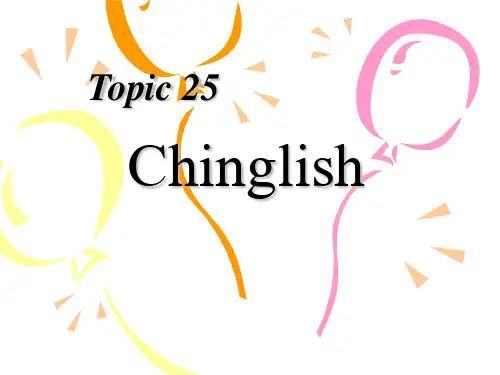
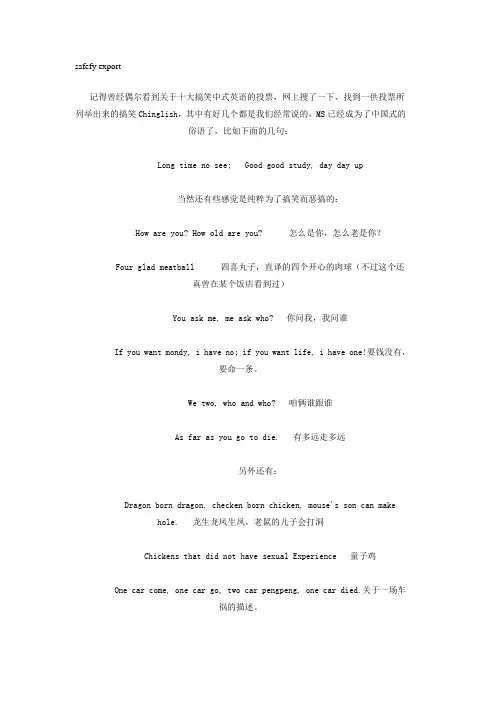
safefy export记得曾经偶尔看到关于十大搞笑中式英语的投票,网上搜了一下,找到一供投票所列举出来的搞笑Chinglish,其中有好几个都是我们经常说的,MS已经成为了中国式的俗语了,比如下面的几句:Long time no see; Good good study, day day up当然还有些感觉是纯粹为了搞笑而恶搞的:How are you? How old are you? 怎么是你,怎么老是你?Four glad meatball 四喜丸子,直译的四个开心的肉球(不过这个还真曾在某个饭店看到过)You ask me, me ask who? 你问我,我问谁If you want mondy, i have no; if you want life, i have one!要钱没有,要命一条。
We two, who and who? 咱俩谁跟谁As far as you go to die. 有多远走多远另外还有:Dragon born dragon, checken born chicken, mouse's son can make hole. 龙生龙凤生凤,老鼠的儿子会打洞Chickens that did not have sexual Experience 童子鸡One car come, one car go, two car pengpeng, one car died.关于一场车祸的描述。
Hourse hourse tiger tiger. 马马虎虎No three no four 不三不四Heart flower angry open. 心花怒发Know is know, noknow is noknow.知之为知之不知为不知You have seed, i will give you some color to see see. Brothers, together up! 你有种,我要给你点颜色看看,兄弟们,一起上!Go past, no mistake past. 走过路过,不要错过TOP ahuun∙帖子:184∙陨石:1109∙组别:新手五阶∙个人空间∙相册∙2009-08-14 17:50 | 只看楼主收藏| 17 #最近看到很多雷人的“中式英语”广告和招牌,真让人好笑!现拷贝几个吓到老外的“中式英语”广告和招牌:1。
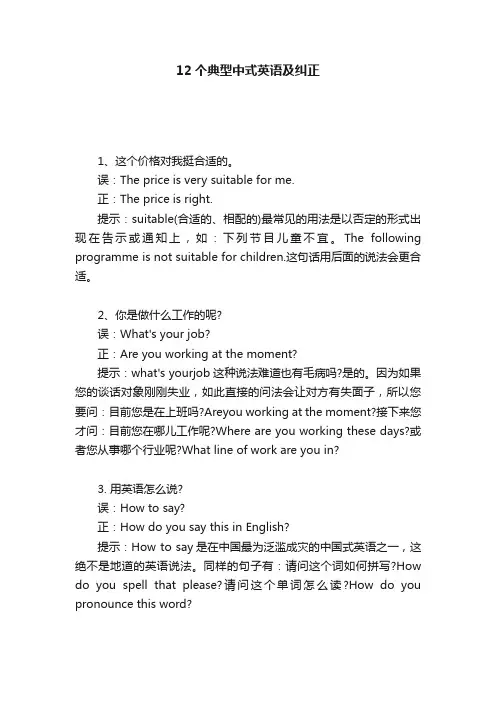
12个典型中式英语及纠正1、这个价格对我挺合适的。
误:The price is very suitable for me.正:The price is right.提示:suitable(合适的、相配的)最常见的用法是以否定的形式出现在告示或通知上,如:下列节目儿童不宜。
The following programme is not suitable for children.这句话用后面的说法会更合适。
2、你是做什么工作的呢?误:What's your job?正:Are you working at the moment?提示:what's yourjob这种说法难道也有毛病吗?是的。
因为如果您的谈话对象刚刚失业,如此直接的问法会让对方有失面子,所以您要问:目前您是在上班吗?Areyou working at the moment?接下来您才问:目前您在哪儿工作呢?Where are you working these days?或者您从事哪个行业呢?What line of work are you in?3. 用英语怎么说?误:How to say?正:How do you say this in English?提示:How to say是在中国最为泛滥成灾的中国式英语之一,这绝不是地道的英语说法。
同样的句子有:请问这个词如何拼写?How do you spell that please?请问这个单词怎么读?How do you pronounce this word?4. 我的舞也跳得不好。
误:I don't dance well too.正:I am not a very good dancer either.提示:当我们说不擅长做什么事情的时候,英语里面通常用not good at something,英语的思维甚至直接踊跃到:我不是一个好的舞者。
5. 现在几点钟了?误:What time is it now?正:What time is it,please?提示:What time is it now是一个直接从汉语翻译过的句子,讲英语的时候没有必要说now,因为您不可能问what time was it yesterday,或者what time is it tommorow?所以符合英语习惯的说法是:请问现在几点了?还有一种说法是:How are we doing for time?6. 我的英语很糟糕。

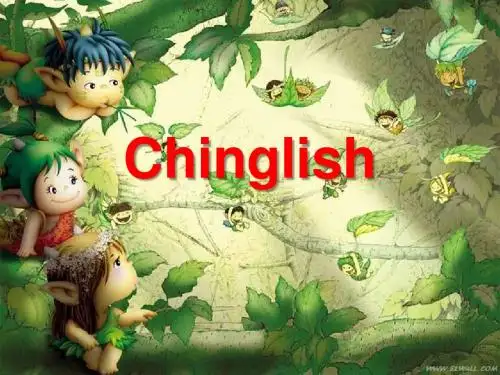


中国式英语翻译中国式英语是指中国人在学习和使用英语时,由于语言习惯和文化背景的不同而产生的一种特殊风格。
以下是对中国式英语的简要翻译。
Chinese-style English refers to a unique style of English language learning and usage by Chinese people, which is influenced by their language habits and cultural background. The following is a brief translation of Chinese-style English.中国式英语(Chinese-style English)是指中国人在学习和使用英语时,由于语言习惯和文化背景的不同,形成的一种特殊风格。
这种风格主要体现在以下几个方面。
1. Vocabulary Errors(词汇错误):Chinese-style English often involves using incorrect or inappropriate vocabulary. Chinese learners sometimes directly translate Chinese words or phrases into English, resulting in confusion or misunderstanding.2. Grammar Mistakes(语法错误):Chinese learners often struggle with English grammar rules, which leads to errors in sentence structure, tense usage, and word order. They may also overuse certain grammar rules or apply them incorrectly.3. Pronunciation Problems(发音问题):Chinese speakers often face difficulties in pronouncing English sounds and distinguishing between similar phonetic sounds. Thiscan lead to misunderstandings or difficulties in communication.4. Literal Translation(直译):Chinese-style English frequently involves translating Chinese idioms, expressions, or proverbs directly into English. This can result in awkward or unnatural language usage that native English speakers may find confusing or unfamiliar.5. Cultural Differences(文化差异):Chinese-style English may also reflect cultural differences and unique Chinese perspectives. Chinese learners might use expressions, metaphors, or examples from Chinese culture that are not commonly understood by native English speakers.It is important to note that Chinese-style English should not be seen as a negative phenomenon. Chinese learners of English are constantly improving their skills and making efforts to communicate effectively in a second language. Understanding the challenges they face can help facilitate better communication and bridge cultural gaps.总的来说,理解中国式英语的特点有助于改进英语教学和沟通交流,更好地促进不同文化之间的了解和融合。
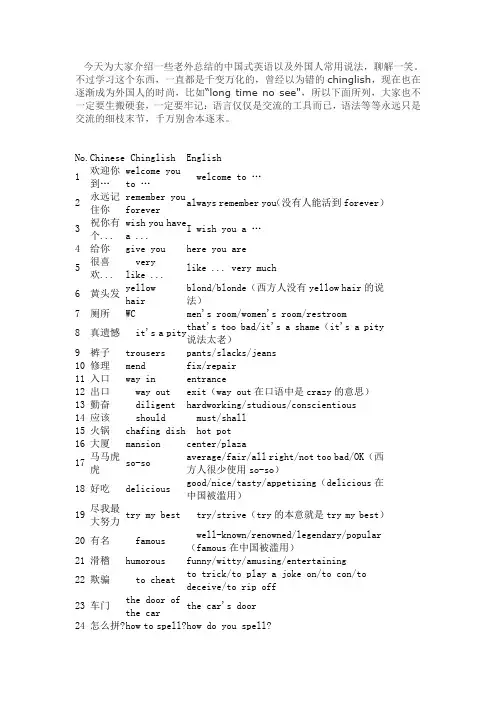
今天为大家介绍一些老外总结的中国式英语以及外国人常用说法,聊解一笑。
不过学习这个东西,一直都是千变万化的,曾经以为错的chinglish ,现在也在逐渐成为外国人的时尚,比如“long time no see",所以下面所列,大家也不一定要生搬硬套,一定要牢记:语言仅仅是交流的工具而已,语法等等永远只是交流的细枝末节,千万别舍本逐末。
No. C hinese Chinglish English1 欢迎你到… welcome you to …welcome to … 2 永远记住你 remember you foreveralways remember you (没有人能活到forever ) 3 祝你有个... wish you have a ...I wish you a … 4 给你 give you here you are5 很喜欢... very like ...like ... very much 6 黄头发 yellow hair blond/blonde (西方人没有yellow hair 的说法)7 厕所 WC men's room/women's room/restroom8 真遗憾 it's a pity that's too bad/it's a shame (it's a pity 说法太老)9 裤子 trousers pants/slacks/jeans10 修理 mend fix/repair11 入口 way in entrance12 出口 way out exit (way out 在口语中是crazy 的意思) 13 勤奋 diligent hardworking/studious/conscientious14 应该 should must/shall15 火锅 chafing dish hot pot16 大厦 mansion center/plaza17 马马虎虎 so-so average/fair/all right/not too bad/OK (西方人很少使用so-so )18 好吃 delicious good/nice/tasty/appetizing (delicious 在中国被滥用)19 尽我最大努力try my best try/strive (try 的本意就是try my best ) 20 有名 famous well-known/renowned/legendary/popular (famous 在中国被滥用)21 滑稽 humorous funny/witty/amusing/entertaining22 欺骗 to cheat to trick/to play a joke on/to con/to deceive/to rip off23 车门 the door of the carthe car's door 24 怎么拼? how to how do you spell?spell?25 再见bye-bye bye/see you/see you later/later(bye-bye 有些孩子气)26 玩play go to/do(play在中国被滥用)27 面条 noodles pasta(noodles有些孩子气)28 据说it is said I heard/I read/I was told29 等等 and so on etc.30 直到现在till now recently/lately/thus far31 农民peasant farmer32 宣传 propaganda information。
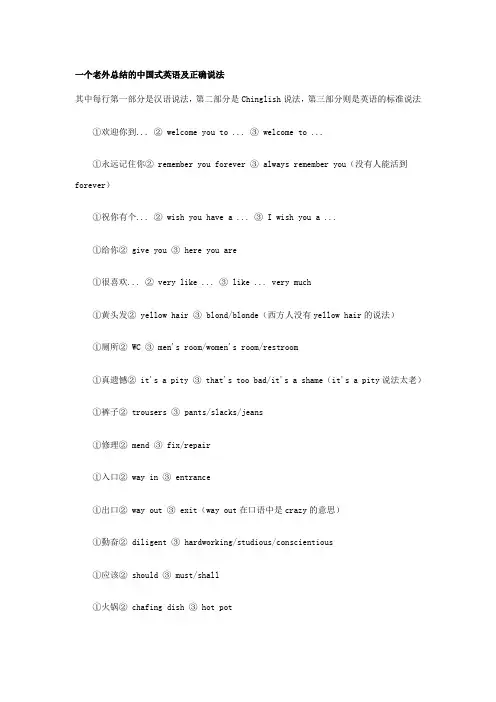
一个老外总结的中国式英语及正确说法其中每行第一部分是汉语说法,第二部分是Chinglish说法,第三部分则是英语的标准说法①欢迎你到... ② welcome you to ... ③ welcome to ...①永远记住你② remember you forever ③ always remember you(没有人能活到forever)①祝你有个... ② wish you have a ... ③ I wish you a ...①给你② give you ③ here you are①很喜欢... ② very like ... ③ like ... very much①黄头发② yellow hair ③ blond/blonde(西方人没有yellow hair的说法)①厕所② WC ③ men's room/women's room/restroom①真遗憾② it's a pity ③ that's too bad/it's a shame(it's a pity说法太老)①裤子② trousers ③ pants/slacks/jeans①修理② mend ③ fix/repair①入口② way in ③ entrance①出口② way out ③ exit(way out在口语中是crazy的意思)①勤奋② diligent ③ hardworking/studious/conscientious①应该② should ③ must/shall①火锅② chafing dish ③ hot pot①大厦② mansion ③ center/plaza①马马虎虎② so-so ③ average/fair/all right/not too bad/OK(西方人很少使用so-so)①好吃② delicious ③ good/nice/tasty/appetizing(delicious在中国被滥用)①尽我最大努力② try my best ③ try/strive(try的本意就是try my best)①有名② famous ③ well-known/renowned/legendary/popular(famous在中国被滥用)①滑稽② humorous ③ funny/witty/amusing/entertaining①欺骗② to cheat ③ to trick/to play a joke on/to con/to deceive/to rip off①车门② the door of the car ③ the car's door①怎么拼? ② how to spell? ③ how do you spell?①再见② bye-bye ③ bye/see you/see you later/later(bye-bye有些孩子气)①玩② play ③ go to/do(play在中国被滥用)①面条② noodles ③ pasta(noodles有些孩子气)①据说② it is said ③ I heard/I read/I was told①等等② and so on ③ etc.①直到现在② till now ③ recently/lately/thus far①农民② peasant ③ farmer①宣传② propaganda ③ information常见的中国式英语错误Chinese : It was so late there was no taxi.American : It was so late that there was no taxi available.Chinese : Your coat is broken.American : Your coat is torn.Chinese : Let me help you to do your work.American : Let me help you with your work.Chinese : Susan didn’t make a fault anyway.American : Susan didn’t make a mistake anyway.Chinese : He becomes better.American : He got better.Chinese : I recommend you to take a long vacation.American : I recommend that you take a long vacation.Chinese : The last bus leaves at eleven o’clock. It’s about eleven now, Hurry up !American : The last bus leaves at eleven o’clock. It’s nearly eleven now, Hurry up !Chinese : It was still bright outside.American : It was still light outside.Chinese : The hall can seat two hundred people.American : The hall seats two hundred people.Chinese : Anywhere will do.American : Any place will do.Chinese : Wait here please, I’ll come back in a minute. American : Wait here please, I’ll be back in a minute.Chinese : I am uncomfortable.American : I don’t feel well.Chinese : Common students in US don’t wear a uniform. American : The average student in US don’t wear a uniform.Chinese : Who cooked this salad ?American : Who made this salad ?。
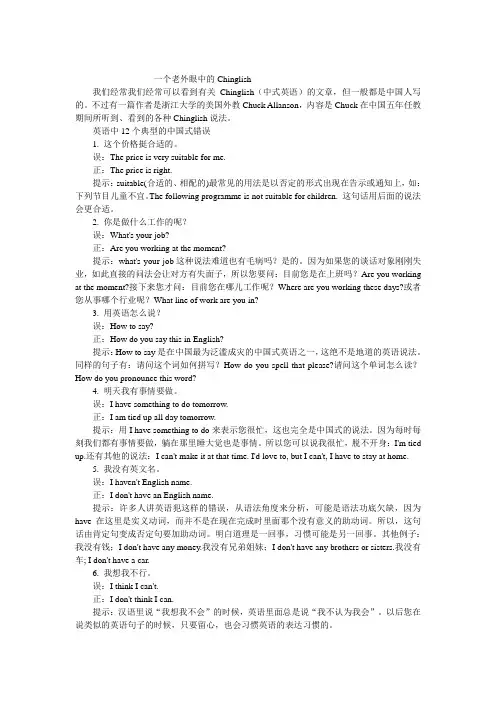
一个老外眼中的Chinglish我们经常我们经常可以看到有关Chinglish(中式英语)的文章,但一般都是中国人写的。
不过有一篇作者是浙江大学的美国外教Chuck Allanson,内容是Chuck在中国五年任教期间所听到、看到的各种Chinglish说法。
英语中12个典型的中国式错误1. 这个价格挺合适的。
误:The price is very suitable for me.正:The price is right.提示:suitable(合适的、相配的)最常见的用法是以否定的形式出现在告示或通知上,如:下列节目儿童不宜。
The following programme is not suitable for children. 这句话用后面的说法会更合适。
2. 你是做什么工作的呢?误:What's your job?正:Are you working at the moment?提示:what's your job这种说法难道也有毛病吗?是的。
因为如果您的谈话对象刚刚失业,如此直接的问法会让对方有失面子,所以您要问:目前您是在上班吗?Are you working at the moment?接下来您才问:目前您在哪儿工作呢?Where are you working these days?或者您从事哪个行业呢?What line of work are you in?3. 用英语怎么说?误:How to say?正:How do you say this in English?提示:How to say是在中国最为泛滥成灾的中国式英语之一,这绝不是地道的英语说法。
同样的句子有:请问这个词如何拼写?How do you spell that please?请问这个单词怎么读?How do you pronounce this word?4. 明天我有事情要做。
误:I have something to do tomorrow.正:I am tied up all day tomorrow.提示:用I have something to do来表示您很忙,这也完全是中国式的说法。
引导语:在各个英语学习论坛上,经常可以看到有关Chinglish(中式英语)的文章,但一般都是中国人写的。
不过我看到过一篇长文,也是有关Chinglish的,但却是美国人写的,很有意思。
这篇长文的标题是Chinglish 2 English(从中式英语到标准英语),作者是浙江大学的美国外教Chuck Allanson,内容则是Chuck在中国五年任教期间所听到、所看到的各种Chinglish说法。
比如Chuck第一次来中国,下飞机后,负责接待他的东北某大学英语系陈老师说:您刚到,我们吃点饭吧。
我们要点Chinese dumpling(饺子)和Chinese beancurd(豆腐),您看可以吗?Chuck以前从未听说过这两种东西,但出于好奇,就说可以,结果饭菜端上来一看,原来就是ravioli(饺子,来自意大利语)和tofu(豆腐,来自日语)。
Chuck当时心里暗想,这两种东西,国际上早已经有通用的说法(ravioli和tofu),他们中国人为什么还要用那种生僻的说法呢?以后Chuck跟陈先生混熟了,就问他,当初你为什么不说ravioli和tofu呢?陈先生听了大吃一惊,连忙解释说,我真的不知道这两个词,而且我们的《英汉词典》上也没有这两个词。
于是Chuck开始意识到,中国的英语教师、英语课本、甚至英语词典肯定存在问题,否则不可能发生这种事情。
在中国五年的任教期间,Chuck收集了大量的Chinglish说法,从中挑选出一组最常见的,编写了上面提到的那篇长文。
下面就是这些Chinglish说法,其中每行第一部分是汉语说法,第二部分是Chinglish说法,第三部分则是英语的标准说法。
①欢迎你到... ② welcome you to ... ③ welcome to ...①永远记住你② remember you forever ③ always remember you(没有人能活到forever)①祝你有个... ② wish you have a ... ③ I wish you a ...①给你② give you ③ here you are①很喜欢... ② very like ... ③ like ... very much①黄头发② yellow hair ③ blond/blonde(西方人没有yellow hair的说法)①厕所② WC ③ men's room/women's room/restroom①真遗憾② it's a pity ③ that's too bad/it's a shame(it's apity说法太老)①裤子② trousers ③ pants/slacks/jeans①修理② mend ③ fix/repair①入口② way in ③ entrance①出口② way out ③ exit(way out在口语中是crazy的意思)①勤奋② diligent ③ hardworking/studious/conscientious①应该② should ③ must/shall①火锅② chafing dish ③ hot pot①大厦② mansion ③ center/plaza①马马虎虎② so-so ③ average/fair/all right/not too bad/OK(西方人很少使用so-so)①好吃② delicious ③ good/nice/tasty/appetizing(delicious在中国被滥用)①尽我最大努力② try my best ③ try/strive(try的本意就是try my best)①有名② famous ③ well-known/renowned/legendary/popular(famous 在中国被滥用)①滑稽② humorous ③ funny/witty/amusing/entertaining①欺骗② to cheat ③ to trick/to play a joke on/to con/to deceive/to rip off①车门② the door of the car ③ the car's door①怎么拼? ② how to spell? ③how do you spell?①再见② bye-bye ③ bye/see you/see you later/later(bye-bye有些孩子气)①玩② play ③ go to/do(play在中国被滥用)①面条② noodles ③ pasta(noodles有些孩子气)①据说② it is said ③ I heard/I read/I was told①等等② and so on ③ etc. etcetera①直到现在② till now ③ recently/lately/thus far①农民② peasant ③ farmer①宣传② propaganda ③ information英语中12个典型的中国式错误1. 这个价格对我挺合适的。
中式英文求正解中国式英语分为两种。
一种是Chinese English,一种是China English。
其中Chinese English就是Chinglish,是用中式的语法和英式的词汇组合成的,属于语言不规范使用。
而China English指的则是中国特有的东西,是允许存在的。
比如“饺子、功夫、气功、阴阳”等词,都用音译进入了英文词典。
生活中的Chinglish(中式英语)既是小错误小尴尬,也会令人捧腹大笑。
1. How are you ? How old are you? 怎么是你,怎么老是你?2. You have seed. I will give you some color to see see. Brothers!Together up!你有种,我要给你点颜色瞧瞧,兄弟们,一起上!3. Dragon born dragon, chicken born chicken, mouse"s son can make hole!龙生龙,凤生凤,老鼠的儿子会打洞!4. Go past, no mistake past. 走过路过,不要错过5. Four Glad Meatballs 直译:四个开心的肉球被用为:四喜丸子6. Wash after relief 用过请冲水解释:中国的厕所光冲(flush)不行,居然还要“洗”7. You ask me,me ask who?你问我,我问谁8. Heart flower angry open. 心花怒放9. One car come,one car go,two car pengpeng,one car died! 关于一场车祸的描述10. Horse horse tiger tiger. 马马虎虎11. Good good study, day day up. 好好学习,天天向上12. No three no four. 不三不四13. Know is know, noknow is noknow. 知之为知之,不知为不知If you want money,I have no;if you want life,I have one! 要钱没有,要命一条14. watch sister 表妹15. fire big 火大Chinglish错误范例:1.Good good study, day day up.建议翻译:Study hard and make progress every day.注:make progeress 取得进步2、你走后门了吧?Chinglish错误范例:Did you walk through the back door?建议翻译:Did you pull some strings?注:pull some strings 表示“找关系,走后门”3、给他点颜色看看。
①欢迎你到。
.. ②welcome you to 。
③welcome to .。
①永远记住你②remember you forever ③always remember you(没有人能活到forever)①祝你有个..。
②wish you have a .。
. ③I wish you a 。
①给你②give you ③here you are①很喜欢.。
②very like... ③like 。
very much①黄头发②yellow hair ③blond/blonde(西方人没有yellow hair的说法)①厕所②WC ③men's room/women’s room/restroom①真遗憾②it's a pity ③that's too bad/it’s a shame(it’s a pity说法太老)①裤子②trousers ③pants/slacks/jeans①修理②mend ③fix/repair①入口②way in ③entrance①出口②way out ③exit(way out在口语中是crazy的意思)①勤奋②diligent ③hardworking/studious/conscientious①应该②should ③must/shall①火锅②chafing dish ③hot pot①大厦②mansion ③center/plaza①马马虎虎②so-so ③average/fair/all right/not too bad/OK(西方人很少使用so—so)①好吃②delicious ③good/nice/tasty/appetizing(delicious在中国被滥用)①尽我最大努力②try my best ③try/strive(try的本意就是try my best)①有名②famous ③well—known/renowned/legendary/popular(famous在中国被滥用)①滑稽②humorous ③funny/witty/amusing/entertaining①欺骗②to cheat ③to trick/to play a joke on/to con/to deceive/to rip off①车门②the door of the car ③the car's door①怎么拼?②how to spell? ③how do you spell?①再见②bye—bye ③bye/see you/see you later/later(bye—bye有些孩子气)①玩②play ③go to/do(play在中国被滥用)①面条②noodles ③pasta(noodles有些孩子气)①据说②it is said ③I heard/I read/I was told①等等②and so on ③etc。
写出一个中国的真实的方式英语作文全文共3篇示例,供读者参考篇1Writing is a true way to express oneself. Through writing, we can convey our thoughts, feelings, and experiences in a meaningful and personal way. In China, writing has a rich history and tradition, with a long legacy of renowned poets, scholars, and philosophers who have used the written word to capture the essence of Chinese culture and society.One of the most authentic ways to write about China is by exploring its rich cultural heritage. From ancient philosophies like Confucianism and Taoism to traditional art forms like calligraphy and Chinese painting, China's cultural traditions offer a window into the country's values, beliefs, and customs. By delving into these traditions in our writing, we can gain a deeper understanding of China's history and identity.Another way to write authentically about China is by exploring its diverse landscapes and natural beauty. From the lush rice paddies of the countryside to the bustling metropolises of Beijing and Shanghai, China's geography is as varied as it isstunning. By describing the sights, sounds, and smells of these different landscapes, we can transport our readers to the heart of China and give them a taste of its natural wonders.Additionally, writing about China's complex social and political landscape can provide valuable insights into the country's current affairs and challenges. From issues like economic reform and urbanization to environmental sustainability and human rights, China faces a host of complex issues that impact its people and its future. By addressing these topics in our writing, we can shed light on the pressing issues facing China today and foster a deeper dialogue on how to address them.Ultimately, writing about China authentically requires a combination of research, observation, and personal reflection. By drawing on our own experiences and insights, as well as on the rich tapestry of Chinese culture, history, and society, we can create a nuanced and compelling portrait of this vast and complex nation. In doing so, we can not only enrich our own understanding of China, but also share its beauty, complexity, and humanity with readers around the world.篇2One Genuine Way to Describe ChinaChina, a country with a history stretching back thousands of years, is a land of contrasts, rich in culture and tradition. From the bustling streets of Beijing to the serene landscapes of Guilin, there is much to discover and explore in this vast nation. But how can one truly capture the essence of China in a single piece of writing?One way to describe China is through its people. Chinese society is built on a strong sense of community and family ties. The Chinese people are known for their hospitality and warmth, always willing to lend a helping hand to those in need. In the streets of Shanghai or the villages of rural Yunnan, you will find a sense of camaraderie that is truly unique to this country.Another aspect of China that cannot be ignored is its rich cultural heritage. From the ancient traditions of Confucianism to the vibrant art of calligraphy, China has a long and storied history that has shaped its identity. The country's architecture, too, reflects this history, with temples and palaces that date back centuries. In cities like Xi'an and Chengdu, you can see this history come to life in the form of ancient monuments and relics.But perhaps the most striking aspect of China is its rapid modernization. In just a few decades, China has gone from aprimarily agrarian society to a global economic powerhouse. Cities like Beijing and Shanghai are now home to some of the tallest skyscrapers in the world, while high-speed trains crisscross the country, connecting even the most remote areas. This juxtaposition of old and new is what makes China truly unique.In conclusion, describing China in a single piece of writing is no easy task. With its rich history, diverse culture, and rapid development, this country is a complex tapestry of tradition and modernity. To truly understand China, one must immerse oneself in its people, its culture, and its way of life. Only then can one begin to appreciate the true essence of this remarkable nation.篇3Writing Out a Real ChinaChina, one of the oldest civilizations in the world, has a rich and complex history that spans thousands of years. From the Great Wall to the Forbidden City, from Confucius to Mao Zedong, there is so much to explore and discover about this vast and diverse country. However, many people have misconceptions about what China is really like, so let's set the record straight and explore what it means to write out a real China.First and foremost, it is important to understand that China is a country of contrasts. From bustling cities like Beijing and Shanghai to remote villages in the countryside, there is incredible diversity in the landscapes, cultures, and people that make up this vast nation. The rapid pace of modernization and development has brought about incredible economic growth and advancements in technology, but it has also created stark disparities between the urban elite and the rural poor. In order to truly understand China, one must be willing to explore both the glitzy skyscrapers of the city and the simple homes of the countryside.Another aspect of real China is its long and storied history. With a recorded history that stretches back over 5,000 years, there is no shortage of stories to be told and lessons to be learned. From the philosophical teachings of Confucius to the revolutionary ideals of Mao Zedong, Chinese history is full of moments that have shaped the nation's identity and culture. Visiting historical sites like the Great Wall, the Terracotta Warriors, and the Summer Palace can give a deeper understanding of China's past and its impact on the present.In addition to its history, China is also known for its rich and diverse culture. From traditional arts like calligraphy, martial arts,and tea ceremonies to modern innovations in fashion, film, and cuisine, Chinese culture is a vibrant and dynamic tapestry of creativity and tradition. Exploring the many facets of Chinese culture can provide new insights into the values, beliefs, and practices that have shaped the nation's identity.Furthermore, real China is a land of warmth and hospitality. Chinese people are known for their kindness, generosity, and strong sense of community. Whether enjoying a meal with a local family, visiting a traditional tea house, or simply wandering the streets of a bustling market, visitors to China will undoubtedly encounter the warmth and hospitality of the Chinese people. This genuine connection with the local culture can provide a deeper appreciation for the beauty and complexity of China.In conclusion, to truly write out a real China is to delve into its history, explore its diversity, and embrace its culture. By immersing oneself in the sights, sounds, and experiences of this vast and dynamic country, one can gain a deeper understanding of what makes China truly unique. So pack your bags, book your ticket, and get ready for an adventure that will open your eyes to the wonders of real China.。
写出一个中国的真实的方式英语作文China is a vast and diverse country with a rich cultural heritage that has been shaped by centuries of history. The Chinese way of life encompasses a wide range of traditions, customs, and practices that reflect the values and beliefs of its people.One of the key aspects of the Chinese way of life is the importance of family. Family is considered the cornerstone of Chinese society, and filial piety is a deeply ingrained value. Respect for elders, taking care of parents, and maintaining close-knit family relationships are highly valued in Chinese culture.Another important aspect of the Chinese way of life is the emphasis on harmony and balance. The concept of yin and yang, as well as the principles of Confucianism and Taoism, play a significant role in shaping Chinese philosophy and behavior. Maintaining harmony in relationships, respecting nature, and seeking balance in all aspects of life are fundamental ideals in Chinese culture.Additionally, the Chinese way of life places a strong emphasis on education and hard work. The pursuit of academic excellence and the belief in continuousself-improvement are deeply rooted in Chinese society. Education is highly valued, and hard work is seen as a key factor in achieving success and prosperity.In modern China, traditional values and customs are still upheld alongside rapid economic development and technological advancements. The Chinese way of life continues to evolve, but the core values of family, harmony, education, and hard work remain integral to the identity of the Chinese people.中文翻译:中国是一个辽阔多样、拥有丰富文化遗产的国家,几个世纪的历史塑造了这片土地。
一个老外总结的中国式英语及正确的说法
其中每行第一部分是汉语说法,第二部分是Chinglish说法,第三部分则是英语的标准说法。
①欢迎你到... ②welcome you to ... ③welcome to ...
①永远记住你②remember you forever ③always remember you(没有人能活到forever)①祝你有个... ②wish you have a ... ③I wish you a ...
①给你②give you ③here you are
①很喜欢... ②very like ... ③like ... very much
①黄头发②yellow hair ③blond/blonde(西方人没有yellow hair的说法)
①厕所②WC ③men's room/women's room/restroom
①真遗憾②it's a pity ③t hat's too bad/it's a shame(it's a pity说法太老)
①裤子②trousers ③pants/slacks/jeans
①修理②mend ③fix/repair
①入口②way in ③entrance
①出口②way out ③exit(way out在口语中是crazy的意思)
①勤奋②diligent ③hardworking/studious/conscientious
①应该②should ③must/shall
①火锅②chafing dish ③hot pot
①大厦②mansion ③center/plaza
①马马虎虎②so-so ③average/fair/all right/not too bad/OK(西方人很少使用so-so)
①好吃②delicious ③good/nice/tasty/appetizing(delicious在中国被滥用)
①尽我最大努力②try my best ③try/strive(try的本意就是try my best)
①有名②famous ③well-known/renowned/legendary/popular(famous在中国被滥用)
①滑稽②humorous ③funny/witty/amusing/entertaining
①欺骗②to cheat ③to trick/to play a joke on/to con/to deceive/to rip off
①车门②the door of the car ③the car's door
①怎么拼? ②how to spell? ③how do you spell?
①再见②bye-bye ③bye/see you/see you later/later(bye-bye有些孩子气)
①玩②play ③go to/do(play在中国被滥用)
①面条②noodles ③pasta(noodles有些孩子气)
①据说②it is said ③I heard/I read/I was told
①等等②and so on ③etc.
①直到现在②till now ③recently/lately/thus far
①农民②peasant ③farmer
①宣传②propaganda ③information。